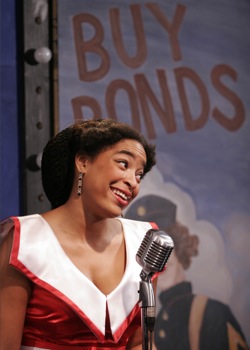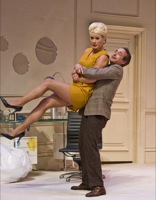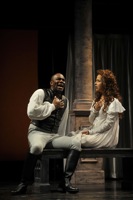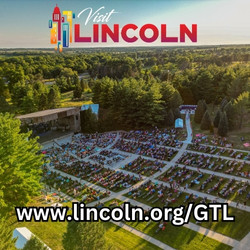 Photo courtesy Barksdale Theatre
Photo courtesy Barksdale TheatreLive theater has thrived around the United States for years, and whether they are shoveling manure from an old barn to get it ready for renovation or rebuilding after fires and hurricanes, theater-lovers are passionate and determined about creating venues for quality plays and musicals.
Some of the venues they’ve created are an open-sided theater with views of New Mexico’s Sangre de Cristo Mountains, a replica of London’s Shakespearean-era Globe theater in Southern California, a former barn in Illinois, a former cement-block gym, a historic Virginia tavern where Patrick Henry once served drinks and an oceanside theater on the very site where the play’s events took place more than 400 years ago
Here’s a sampling of long-lasting theaters that represent a variety of theatrical productions presented in unusual venues.
The Old Globe
San Diego
It’s an exciting time for the Tony Award-winning Old Globe, which had a monthlong celebration of the opening of its new Conrad Prebys Theatre Center in late 2009 and is having a yearlong series of events to mark its 75th anniversary this year.
 |
| Courtesy The Old Globe |
The Old Globe campus, located in San Diego’s sprawling Balboa Park, includes the Old Globe theater; the 612-seat outdoor festival theater; and the new Prebys Theatre Center, which features a modernistic new home for the intimate 250-seat Sheryl and Harvey White Theatre and the redesigned Copley Plaza, which connects the three venues.
“It was originally built as a replica of the Globe in London in 1935 for the California Pacific International Exposition,” said Jeffrey Weiser, the Old Globe’s public relations director. “It didn’t have a ceiling, like London, but soon afterward, they added a roof. The sun was killing people.”
In the 1980s, following a fire, the 600-seat theater was rebuilt like the original.
The Old Globe, which has premiered several Broadway-bound plays, produces a year-round season of 15 plays and musicals, including its annual Shakespeare festival in the amphitheater, on its three stages.
“It’s a very busy time,” said Weiser in early May. “We have three plays in repertory in our outdoor venue, a Broadway-bound musical in the Globe and another show with Marion Ross from “Happy Days” in the White Theatre.
“All are joined by the Copley Plaza, which is like an outdoor lobby. It’s quite lively and nice with everybody mingling.”
www.theoldglobe.org
619-231-1941, ext. 2408
groups@TheOldGlobe.org
Quad Cities
“We like our theater here in the Quad Cities,” said Jessica Waytenick, communications manager for the Quad Cities Convention and Visitors Bureau, which represents five cities along the Mississippi River in Iowa and Illinois that have a long tradition of local community theater.
The Quad City Music Guild, with a 60-year tradition of using exclusively local volunteer performers and musicians, presents Broadway musicals in the Prospect Park Auditorium in Moline, Ill., during the summer.
The Genesius Guild, founded in 1956, specializes in free classical drama on an outdoor stage in Lincoln Park in Rock Island, Ill. It presents Greek drama and comedy, Shakespeare plays and works by other classical playwrights every weekend throughout June, July and August.
The Playcrafters Barn Theatre, begun in 1929, presents community theatrical productions year-round in a renovated barn in Moline. When the 1914 barn was donated to the Playcrafters in 1958, it had not been used for 25 years. Volunteers spent three months shoveling several feet of manure out of the barn so it could be converted into a theater, which opened in 1960. Another renovation took place in the 1990s.
“They use local actors, but these are professional productions,” said Waytenick. “They go through the audition process. It is top-notch theater. They always do a great job; it’s not something that just happens. These have been around for more than 50 years, and there definitely is a tradition of quality there.”
www.visitquadcities.com
800-747-7800
“The Lost Colony”
Manteo, N.C.
Unlike the unfortunate English settlers it depicts, “The Lost Colony,” America’s first outdoor symphonic drama, has survived and endured.
 |
| Courtesy Roanoke Island Historical Association |
Written by Pulitzer Prize-winner Paul Green in 1937, the elaborately costumed play tells the story of the group of 16th-century colonists who mysteriously disappeared after settling on North Carolina’s Outer Banks.
“The Lost Colony” is presented in the open-air Waterside Theatre overlooking the Roanoke Sound inside Fort Raleigh National Historic Site on the very spot where the colonists settled.
The theater has been reconstructed twice, the first time after a fire burned the original to the ground in 1947 and the second time in 1960 after Hurricane Donna swept most of it into the sound.
Groups can take a nightly 45-minute backstage tour that includes watching scenery change on stage and visits to the costume shop and props area.
“The Lost Colony” is presented from May through August.
www.thelostcolony.org
252-473-3414 (May-Aug.)
252-473-2127 (Sept.-April)
Barksdale Theatre
Richmond, Va.
Although the Barksdale Theatre claims the title as the first dinner theater in the country, it is no longer a traditional dinner theater. However, a restaurant is available at one of its two theaters.
“It has grown into the largest theater company in central Virginia,” said public relations manager Judi Crenshaw. “We have two options.
“One is a country playhouse, which a lot of big bus groups come to, in a historic tavern in Hanover. Patrick Henry used to tend bar there.”
A 200-seat theater is on the ground floor, with a separately run restaurant on the upper floor.
“Our main stage theater is in Richmond in a more suburban area,” said Crenshaw. “It is our Signature Series, with more cutting-edge and contemporary drama and big musicals. It seats 244.”
The Barksdale began 57 years ago in the historic tavern, which dates to the 18th century. “That’s where we had our humble beginning,” said Crenshaw.
After a 10-year lapse, during which plays were presented only in Richmond, the company returned to the tavern in 2006, and it now presents a four-play Country Playhouse season there.
The Signature Series, at what is known as Willow Lawn, features five plays throughout the year.
Crenshaw said both current locations have seats on three sides of the stage, and “we are the only full-equity house in central Virginia.”
www.barkdsdalerichmond.org
804-282-9440 (group reservations)
804-537-5050 (restaurant reservations)
Santa Fe Opera
Santa Fe, N.M.
The high New Mexico desert around Santa Fe might not be the first place you would think of for seeing an opera. However, the Santa Fe Opera has been presenting high-quality opera productions there for more than 50 years and this year will stage the first major U.S. production of Vivaldi’s “Griselda.”
“People don’t expect, in a little town like Santa Fe, world-class opera. We are world-class,” said Kathy Murphy Prenevost, group sales manager.
The Santa Fe Opera, which is popular with groups, presents five plays annually in July and August in its 2,100-seat adobe theater, which blends into the desert landscape and whose open sides provide great views of the nearby mountains.
“Whether you love opera or don’t know anything about it, the venue is so outstanding,” said Prenevost.
Translation screens are positioned in front of every seat, and groups can attend a lecture buffet about the performance before the show that includes a meal and wine under a canopy next to gardens and a swimming pool. There are also backstage tours before the dinner.
www.santafeopera.org
505-986-5911
Shakespeare and Company
Lenox, Mass.
For the first 22 years after she founded Shakespeare and Company in 1978 in the Berkshires of Western Massachusetts, London transplant and Shakespeare expert Tina Packer used the estate of another famous writer, Edith Wharton.
 |
| Courtesy Shakespeare and Company, by Kevin Sprague |
Packer initially used the stable at Wharton’s former estate, the Mount, as a theater and then built a 600-seat outdoor main stage in the woods behind the house.
In 2001, Shakespeare and Company moved to a 63-acre site it purchased in Lenox, which included more than 20 buildings from another early-20th-century summer estate. A former cement-block gymnasium was converted into an innovative 406-seat scaffold-and-canvas performance venue that seats the audience on three sides and two levels of the action on armless cushion-backed benches.
“It was very exciting for us,” said Elizabeth Aspenlieder, director of publicity. “It has a very actor-audience relationship. The seats are close together. In Shakespeare’s time, that was the way it was. The energy of the audience was infective. That is the design of this theater. It is very Elizabethan.”
Groups can arrange for backstage tours and tours of the costume shop and gardens; they can also meet with the artists.
Several of the other buildings on the estate have been renovated for a small theater, offices, rehearsal space, dormitories, a dining area, and costume and technical shops. Future plans call for re-creating the Rose Theater from Shakespeare’s time with a surrounding Elizabethan village on the site.
www.shakespeare.org
413-637-1199, ext. 132
Theater Section:
Broadway wows crowds, if not critics
Adams Family and Little Miss Sunshine to hit the road
WEB EXCLUSIVE! Browse Broadway show listings
WEB EXCLUSIVE! 2010-2011 Theater Schedules











